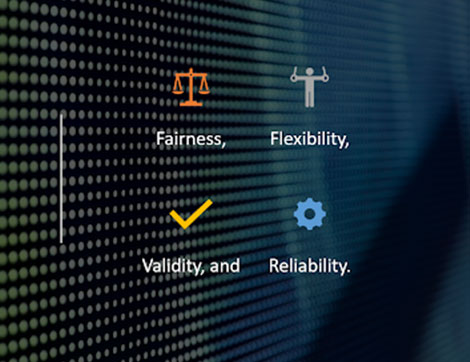An easy way to learn them:
“Life isn’t fair, so you have to be flexible”
“What’s the point of being valid if you’re not reliable?”
What are the principles of assessment?
Fairness
During the RTO Assessment process, the Fairness principle considers the individual learner’s needs.
What steps do RTOs take to ensure that the assessment process is fair?
The learning needs of individual learners are the responsibility of the RTO, and this can be done by incorporating ‘reasonable adjustments’.
The term ‘reasonable adjustments must be understood to mean adjustments that do not compromise the integrity of the training/assessment or cause undue hardship to the RTO.
The concept of “reasonable adjustments” basically means that RTOs should be able to offer the same training and education opportunities to learners with disabilities or special needs as those without.
Additionally, the RTO must ensure that the learner understands the assessment process and has the right to challenge the assessment outcomes.
This should be documented in the RTO Assessment tool as evidence that the learner has been told about the process and understands it.
A reassessment can be conducted if needed according to the principles of fairness.
As a result of this principle, learners will be able to access training and will not be disadvantaged in the process if they require additional support. Creating a level playing field, ensures fairness.
Flexibility
During the RTO Assessment process, the flexibility principle considers the individual learner’s needs.
What steps do RTOs take to ensure that the assessment process is flexible?
When RTO Assessment is conducted, the Flexibility principle, like the Fairness principle, considers the various needs of learners.
It ensures that assessments are responsive to the needs of individual students and their particular learning styles and preferences.
There are a number of ways that RTOs can demonstrate flexibility in their assessment processes. Some examples include:
Allowing students to submit photos, audio recordings, or videos as evidence
Using drawing boards, visual aids, or sound recordings during the assessment process
Providing opportunities for students to interact with various mediums during the assessment process
Flexibility in assessment ensures that all students have an equal opportunity to demonstrate their knowledge and skills, regardless of their learning style or preference. This ultimately leads to more accurate and reliable assessment outcomes.
Validity
Training providers justify assessment decisions based on evidence of student performance.
What steps do RTOs take to ensure that the assessment process is valid?
This means that the assessments used must be able to accurately measure the skills and knowledge required for the particular job or task.
Demonstrating the principle of validity in the assessment process is essential to ensuring that assessments are fit for purpose and produce reliable results.
Qualified students are only awarded qualifications or recognised as competent for a particular job or task if they meet the required standards.
Based on performance evidence, the Validity principle ensures that RTO Assessment decisions are valid. In essence, it means that the assessment process does what it claims, that is, assesses each learner’s competency. This process must meet the following requirements in order to be valid:
Competent performance requires a broad range of skills and knowledge that are assessed
The assessment of knowledge and skills is integrated with the application of those skills
As a result of the assessment, the learner can demonstrate skills and knowledge when needed
A competency can be determined by aligning the learner’s performance with a unit or units of competency and the requirements for assessment
Your RTO Assessment tool must be able to confirm the repeatability of performance and address all requirements of each unit. In order for an assessment to be valid, it cannot omit anything from the unit or require anything beyond what is required.
The training and assessment process in the VET sector is underpinned by the principle of validity. There are a number of ways in which this principle can be demonstrated in the assessment process:
1. The content of the assessment must be relevant to the skills and knowledge required for the job or task.
2. The assessment tasks must be designed to allow candidates to demonstrate their skills and knowledge in a way that is meaningful and useful.
3. The assessor must have the necessary expertise and experience to properly understand and interpret the candidate’s performance on the assessment tasks.
4. The assessment process must be conducted in a fair and unbiased manner.
5. The results of the assessment must be accurately reported and used appropriately to make decisions about the candidate’s skills, knowledge and suitability for the job or task.
Reliability
RTO Assessments must be consistent, meaning that all assessors should reach the same conclusion regarding the learner’s competency given the same conditions for the same unit of competency.
What steps do RTOs take to ensure that the assessment process is Reliable?
One way to ensure reliability in the assessment process is to provide assessors with written questions and answers for each assessment task.
This allows assessors to familiarise themselves with the content of the task, and to identify any areas where they may need further clarification.
Additionally, providing space for assessors to make comments on each criterion helps to ensure that all aspects of the learner’s performance are taken into account.
Another way to maintain reliability in the assessment process is to conduct regular training sessions for assessors.
This allows assessors to keep up to date with changes to the assessment process, and to share best practices with other assessors.
It is important for evidence presented for assessment to be consistently interpreted, and for assessment results to be comparable regardless of who is assessing the evidence.
Furthermore, conducting regular audits of the assessment process can help to identify any areas where improvements can be made.
You should be confident about your RTO Assessment tool’s Fairness, Flexibility, Validity and Reliability. These assessment principles must be considered by your RTO when developing or purchasing resources for your RTO.











